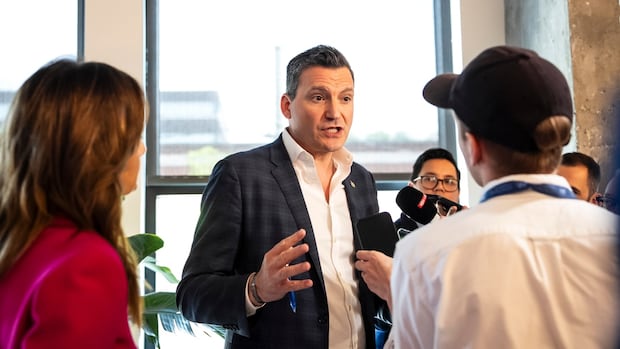The Canadian artificial Minister of Intelligence is closely monitored by Canada and US trials to determine the following steps in the Ottawa regulation method for AI.
Some AI companies have demanded early profits south of the border, and Openai is now fighting the jurisdiction of the Ontario Court to hear the lawsuit of the news publishers.
In his statement, Evan Solomon’s office stated that he intends to deal with copyrights in “Canada’s wider AI -regulation approach, focusing on protecting the sovereignty of culture and how (creators) the factors in this debate.”
But there are no current plans for an independent copyright invoice, as the Salomon office “monitors closely ongoing trials and market development” to help the path forward.
It is unclear how long these legal matters are to determine whether artificial intelligence companies can use copyright content to train their AI products.
CBC/Radio-Canada, Postmedia, Metroland, Toronto Star, The Globe and Mail and the Canadian press have launched a common trial against the chatgpt-creator Opena, to use the news content to train a chatgpt-generative artificial intelligence system. According to news organizations, Openai violates copyrights by “scratching content” on the website.
At the end of last year, the coalition of the News Publicers launched the only question to ask Canada, and the Judicial Challenge of Ontario’s higher court is to be heard in September.
The coalition-rich one includes the Canadian press, Thursday, Globe and Mail, Postmedia and CBC/Radio-Canada Challenge to use Openai news content to train its generative artificial intelligence system.
News publicists claim that Openai violates copyrights by scrapping the large amounts of content of Canada media and then benefit from the use of that content without permission or compensation.
They said in the court’s archiving that Openai has “practiced continuous, deliberate and unauthorized abuse (their) valuable media.”
“Instead of trying to obtain information legally, Openai has chosen to wrinkle the most valuable abuse of the media’s valuable intellectual property rights and change it for its own use, including commercial purposes, without consent or attention.”
Openai challenging jurisdiction
Openai has denied the allegations and previously said that its models have been trained in public information and “thoroughly fair use and related international copyright principles”.
In San Francisco, the headquarters company challenges Ontario’s court to hear the case.
It claimed to the court that it was not in Ontario and does not do business in the province.
The New York Times challenges Openain and Microsoft challenges them to use millions of newspaper articles without permission to train artificial intelligence technology.
Openai also claimed that copyright law would not apply outside Canada.
Openai asks the court to close some documents in the matter. The court is expected to organize a consultation on the sealing business on July 30, according to the timetable in the court documents.
It asked the court to close documents containing “commercially sensitive” information, including its business organizations and structures, its web indexing and search processes and systems, and “model training and conclusion processes, systems, resource allocations and/or cost structures”.
“The artificial intelligence industry is very competitive and develops rapidly,” says insurance provided by the company. “Competitors in this field are many and range from large, well -established technology companies, such as Google and Amazon, to smaller startup companies that seek to establish a foothold in industry.
“As recognized leaders of artificial intelligence, respondents ‘competitors and potential competitors would benefit from accessing the respondents’ confidential information.”
The lawyer of the newsletter provided information on the court’s deadlines but did not comment on the case.
Numerous AI systems and copyrighted litigation are underway in the United States, some of which have come from 2023. At the end of June, AI companies won in two cases.
In the case launched by the writers’ group, including comedian Sarah Silverman, the judge decided to use AI’s own use of AI and the authors did not show that the use would lead to market dilution.

But the judge also said that his decision only affects certain writers – whose lawyers did not make the right claims – and does not mean the use of META’s copyright material to train systems. Judge Vince Chhabria stated in his summary sentence that “in a large system of matters, the consequences of this decision are limited”.
In a separate US case, the referee decided to use the AI company to use the anthropic published books without permission to train systems. But judge William Alsup also decided that the anthropy “had no right to use illegal copies”.
Jane Ginsburg, Professor of Legal School at the University of Columbia, who is studying intellectual property rights and technology, said it would be too simple to look at only cases as complete winnings for AI companies.
“In my opinion, the question of how much weight is to give the pirate of the sources and the issue of the dilution of the market will be big questions in other cases.”

